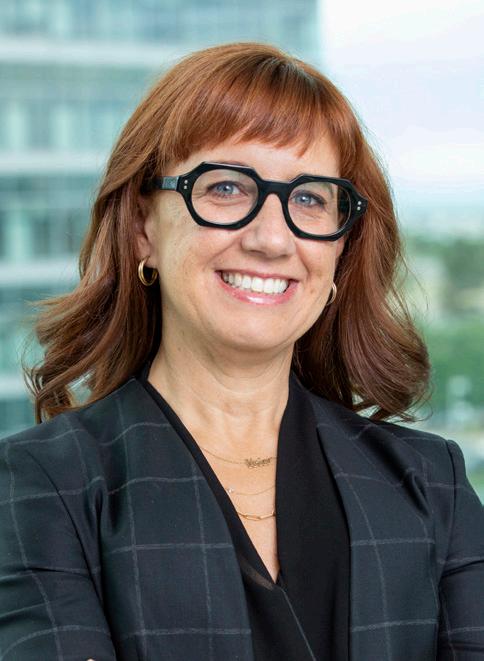
2 minute read
Finding a New Voice
Groundbreaking research led by Sana Karam, MD, PhD, shows potential to improve the standard of care for people with certain head and neck cancers.
By Rachel Sauer
Advertisement
Jane Hart is many things: extremely proud mom of Shelby, daughter extraordinaire and apple of Jane’s eye. Dog mom to Maizy, Taco, Winnie, and Walter. Collector of Talavera pottery. Unabashed “Real Housewives of Salt Lake City” fan. A surprising 71 years old, because she looks at least 10 years younger.
Cancer survivor—stage 4 laryngeal cancer that necessitated a tracheostomy and laryngectomy, forcing her to relearn how to breathe and talk.
But here’s what Hart isn’t: bitter. Angry. Tending toward regret or hesitant to meet new people.
“I have been truly blessed,” she says, and not just because her scans now show no evidence of disease, or because her risk of cancer recurrence is low, or even because she has earned moments and days that she thought wouldn’t be hers when she received a cancer diagnosis in early 2021.
She counts herself blessed that she was the last participant enrolled in a clinical trial whose results show tremendous potential to improve the standard of care for patients diagnosed with a subset of head and neck cancers.
The recently published study, led by University of Colorado Cancer Center member Sana Karam, MD, PhD, vice chair of translational research in the CU School of Medicine, demonstrates that one cycle of the immunotherapy drug durvalumab, used in a specific time frame before surgery and in concert with radiation therapy, can stimulate a patient’s immune system to kill all or most of the cancer before surgery.
“We looked at the existing standard of care and said, ‘OK, patients are still not doing very well,’” Karam says. “We started looking at the time when patients are prepping for surgery as a window of opportunity to do something, to change the course of the disease. We gave this combination of one cycle of durvalumab and three sessions of radiation in high doses pre-operatively, and the response rate was out of this world.”
“The last thing I expected to hear”
Before a treatment response that exceeded all expectations, though, Hart was a bit hoarse.
She’d recently moved from Kansas to Denver to be closer to Shelby; she was enjoying building her life in Colorado; and initially she thought nothing of the hoarseness. She’d always been healthy.
“I used to smoke,” she says, “so I was thinking maybe it had something to do with that?”
In early 2021, it was enough of an issue that she met with an otolaryngologist, who let her know that one of her vocal cords had no blood flowing through it. Humans only have two that produce sound, so this was a huge concern. A scope and a biopsy followed, and then a stark diagnosis: stage 4 laryngeal cancer. Hart passed out in the doctor’s office after hearing it.
“My husband had lung cancer, but I had no family history,” she says. “That was the last thing I expected to hear. The only thing I could do was lay it on the Lord.”
She began working with a multidisciplinary care team that included Jessica McDermott, MD, deputy assistant director for diversity and inclusion in clinical research in the CU Cancer Center, and Julie Goddard, MD, an assistant professor of otolaryngology in the CU School of Medicine.
After meeting with Goddard to discuss the tracheostomy she would receive, Jane learned about the clinical trial Karam was leading, studying human papillomavirus-unrelated head and neck squamous cell carcinomas (HNSCC). Jane’s diagnosis was an HNSCC, and she qualified for the trial.










